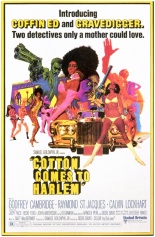
 Although often lumped in with the blaxploitation films of the period, Ossie Davis’ Cotton Comes to Harlem feels a lot less Superfly and a lot more like a classic ’70s buddy cop movie, albeit one set in a Harlem where the possibility of a race riot is always just a few minutes away. The result is one of the most entertaining films the period produced.
Although often lumped in with the blaxploitation films of the period, Ossie Davis’ Cotton Comes to Harlem feels a lot less Superfly and a lot more like a classic ’70s buddy cop movie, albeit one set in a Harlem where the possibility of a race riot is always just a few minutes away. The result is one of the most entertaining films the period produced.
Based on a Chester Himes novel, Cotton stars Raymond St. Jacques and Godfrey Cambridge as Coffin Ed Johnson and Gravedigger Jones, two police detectives whose detached cynicism is only matched by their sense of justice. Viewed by the black citizens they serve as Uncle Toms in cahoots with a racist police force, and by their white co-workers as black troublemakers who don’t know their place, they’re classic outsiders who aren’t above breaking the rules (and law) to do what they know is right.
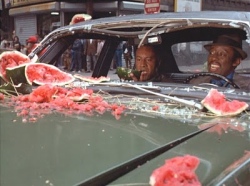 In this case, it’s finding the $87,000 “stolen” from crooked Rev. Deke O’Malley (Calvin Lockhart), who has promised credulous investors that their funds are going to the construction of a boat to take them back to Africa and away from the racism they have to deal with everyday. Once it’s determined that the money has been hidden in a bale of cotton retrieved by kindly street person, Uncle Bud (Redd Foxx), the race is on between Johnson and Jones to find it before the bad guys.
In this case, it’s finding the $87,000 “stolen” from crooked Rev. Deke O’Malley (Calvin Lockhart), who has promised credulous investors that their funds are going to the construction of a boat to take them back to Africa and away from the racism they have to deal with everyday. Once it’s determined that the money has been hidden in a bale of cotton retrieved by kindly street person, Uncle Bud (Redd Foxx), the race is on between Johnson and Jones to find it before the bad guys.
Despite touching on some rather heavy social themes, director/co-writer Davis keeps the tone light and often comic, thanks to the efforts of his talented cast. The soundtrack also features standout work by Galt MacDermott and is worth buying on its own. Two years later, St. Jacques and Cambridge reprised the roles in Come Back, Charleston Blue, a sequel Davis on which chose not to work. —Allan Mott


 According to my trusty Leonard Maltin iPhone app, director Curtis Harrington was so disappointed with the television version of his
According to my trusty Leonard Maltin iPhone app, director Curtis Harrington was so disappointed with the television version of his 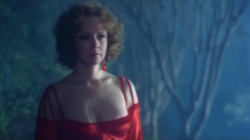
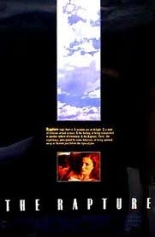
 In retrospect, it seems amazing that writer/director Michael Tolkin was able to get
In retrospect, it seems amazing that writer/director Michael Tolkin was able to get  Unable to kill herself, she is saved from imprisonment by the titular event, only to face the near-impossible choice of loving the deity who caused her so much pain or spending the rest of eternity in desolate isolation.
Unable to kill herself, she is saved from imprisonment by the titular event, only to face the near-impossible choice of loving the deity who caused her so much pain or spending the rest of eternity in desolate isolation.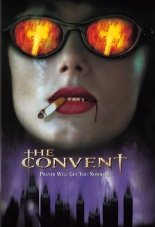
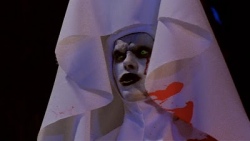 The trouble starts when super-cute Goth girl is sacrificed by a quartet of pathetic Satanists, which causes the demons that necessitated the previous massacre to rise up from wherever they went the last time this all went down. In the end, the only person who can stop the demons from raising the Antichrist is the hot, 50-something version of the hot schoolgirl who took care of the problem the first time.
The trouble starts when super-cute Goth girl is sacrificed by a quartet of pathetic Satanists, which causes the demons that necessitated the previous massacre to rise up from wherever they went the last time this all went down. In the end, the only person who can stop the demons from raising the Antichrist is the hot, 50-something version of the hot schoolgirl who took care of the problem the first time.
 Urich is forced to watch helplessly as his wife (Joanna Cassidy) and kids (Barrett Oliver and Soleil Moon-Frye) are corrupted by Jones’ influence and sell their souls to her behind his back. Without any other option, he does what any good father would do: Don his experimental space suit and go down straight to Hell to rescue them. It goes without saying that he is able to do so by defeating Lucci through the eternal power of love.
Urich is forced to watch helplessly as his wife (Joanna Cassidy) and kids (Barrett Oliver and Soleil Moon-Frye) are corrupted by Jones’ influence and sell their souls to her behind his back. Without any other option, he does what any good father would do: Don his experimental space suit and go down straight to Hell to rescue them. It goes without saying that he is able to do so by defeating Lucci through the eternal power of love.